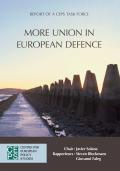“More Union in European Defence”
 On 9 March 2015, the Centre for European Policy Studies (CEPS) launched a Task Force report entitled “More Union in European Defence”. The CEPS Task Force was chaired by Javier Solana, former EU High Representative for CFSP, Secretary General of NATO, and Foreign Minister of Spain. The numerous members of the Task Force were high-level experts in the field of European security and defence.
On 9 March 2015, the Centre for European Policy Studies (CEPS) launched a Task Force report entitled “More Union in European Defence”. The CEPS Task Force was chaired by Javier Solana, former EU High Representative for CFSP, Secretary General of NATO, and Foreign Minister of Spain. The numerous members of the Task Force were high-level experts in the field of European security and defence.
The report opens with the statement that “the Common Security and Defence Policy (CSDP) is the weakest link in the European integration project”. The Task Force is of the opinion that the Treaty of Lisbon demands and permits a great deal more in terms of our common security and defence activities. Moreover, member states could achieve much more value for money than the 190 billion euro they spend to keep up 28 national armies, roughly comprising 1,5 million service personnel. The report brings up the question “If not now, when?”. According to Javier Solana, more than 70 % of the European public is in favour of a broad EU-project on defence. He reminded that 22 EU member states are also NATO members and that there is a mind shift with several new EU leaders. Last but not least, he is of the opinion that there is a “political momentum” in several member states and therefore the moment to act is “now”.
The report stipulates that the CSDP needs to be more efficient and effective if it is to meet today’s security challenges and promote the own values and interests of the EU. One cannot deny that years of uncoordinated cuts in defence spending have eroded the role of the EU as a security actor and this at a moment when the EU faces numerous emergencies and security threats in its strategic neighbourhood.
The CEPS Task Force has drawn up its proposals with the aim to strengthen defence cooperation in the EU and with the opinion that the necessary defence integration should amount to a “European Defence Union” (EDU). The shape of this EDU is defined in the report as the cornerstone of a comprehensive, civil-military security architecture in Europe. Within the report, the Task Force recommends an array of policy actions for further cooperation and integration. These recommendations touch all aspects of the defence debate.
The first recommendations concern a strategic upgrade with, among others, a contribution to territorial defence complementary to NATO and the political and military ability to autonomously conduct operations beyond the EU borders. Then the report recommends a reform of institutions, procedures and financing mechanisms. In this field it proposes the establishment of a Council of Defence Ministers and an upgrade of the European Parliament Subcommittee on Security and Defence (SEDE) to a fully-fledged Committee. Last but not least, the report recommends introducing a “European Semester” for member states’ defence budgets and capability development plans.
Just now when the President of the European Commission, Jean-Claude Juncker, states that there is a need to go towards a European army, and in preparation of the June 2015 security and defence summit, the CEPS Task Force report is a welcomed and very useful document that highly contributes to this important debate.
The full report can be read online on ceps.eu
